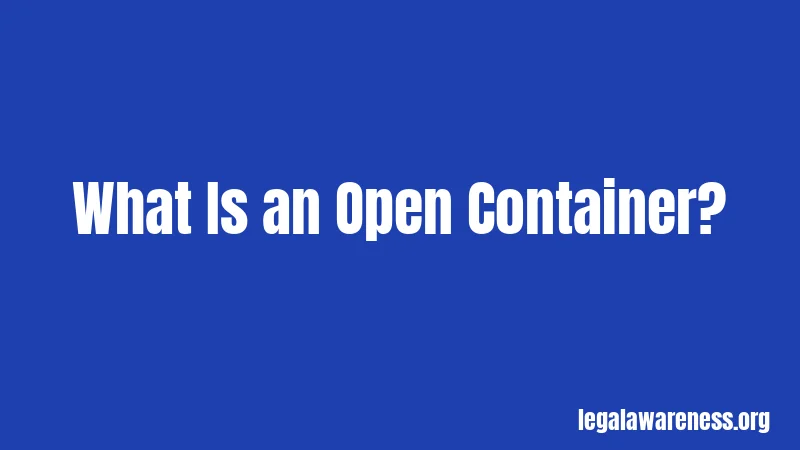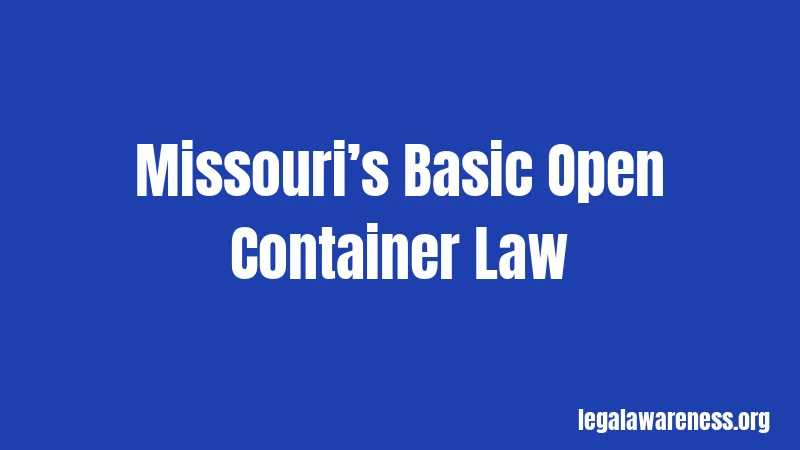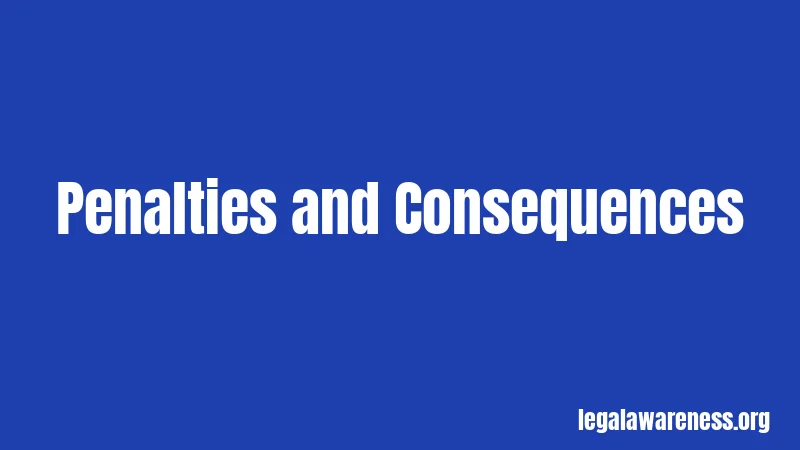Open Container Laws in Missouri (2026): Everything You Need to Know Before You Drive
Most people have no idea how strict Missouri’s open container laws really are. Seriously. You could be breaking the law without even realizing it. Let’s talk about what’s actually illegal, what the penalties look like, and how to stay on the right side of this law.
Missouri takes open container violations seriously. The state wants to reduce drunk driving accidents. That’s why the rules are pretty clear. Understanding them now could save you from a ticket, a fine, or worse.
What Is an Open Container?

Okay, let’s start with the basics. An open container is any drink with alcohol that’s already been opened. It could be a beer bottle with the cap off. A wine glass with liquid in it. A mixed drink in a cup. Once that seal is broken, it counts as an open container.
But here’s the part that trips people up. The container itself doesn’t have to be totally empty. It just needs to be opened and have been opened recently. Pretty straightforward, right?
Why These Laws Exist
You’re probably wondering why states even have these rules. Think of it like this: open container laws are designed to prevent drunk driving before it happens. If alcohol is open in your car, it’s easier to drink it while driving. So the law makes it illegal to have opened alcohol anywhere in your vehicle.
These laws protect everyone on the road. They’re not just about catching people. They’re about prevention. Makes sense, right?
Missouri’s Basic Open Container Law

Here’s where things get specific to Missouri. The state has a pretty straightforward open container statute. You cannot have any open alcoholic beverage in your vehicle. Period.
The key word here is “vehicle.” This applies to cars, trucks, vans, and motorcycles. It includes the passenger area and even the trunk if you’re driving around. Hold on, the trunk part is important. More on that in a second.
Where exactly are open containers banned? The law covers the passenger area of your vehicle. That includes the driver’s seat, passenger seats, and the back seat. The trunk is technically allowed, but we’ll explain that carefully.
Actually, let me clarify the trunk situation. An open container in the trunk is technically legal in Missouri. But there’s a catch. It still needs to be truly sealed. If you have an opened bottle rolling around back there, you could face issues.
What Counts as a Violation?
Not sure what exactly counts as breaking this law? Let me break it down. You’re violating Missouri’s open container law if you have an opened alcoholic drink in the passenger area of your vehicle. Period.
This includes beer, wine, liquor, or any drink with alcohol in it. It doesn’t matter if you were drinking it or if it’s been sitting there untouched. Once it’s open and in the passenger area, it’s illegal.
What about partially consumed drinks? Yes, those count. The drink doesn’t have to be freshly opened. If someone cracked it open hours ago, it still violates the law. You’re not alone if this confuses you. Most people don’t realize how strict this actually is.
What if the container is closed but not sealed? Here’s a tricky one. If the cap is back on but the seal is broken, you could argue it’s no longer “open.” But honestly, this is where things get gray. The safest approach? Keep all alcohol in sealed, unopened containers.
Penalties and Consequences

So what happens if you break this law? The penalties can hit your wallet pretty hard. Missouri takes these violations seriously.
If you get caught with an open container, you’re looking at a fine. The base fine is around $100 to $300 for a first offense. That might not sound terrible until you add in court costs and other fees. Your total could easily hit $400 to $500.
But wait, there’s more to know. If this is your first violation, you might just pay a fine. If you’ve had violations before, penalties get worse. A second offense could land you a fine up to $500 or even jail time up to 30 days.
Here’s where it gets serious. If your open container violation happens while you’re driving, and a cop thinks you’ve been drinking, things escalate fast. You could face additional charges for reckless driving or even DUI.
Can You Have Alcohol in Your Car at All?
This is one of the most common questions. The short answer? Yes, but it has to be completely sealed. Think of it like this: sealed bottles in a grocery bag are totally fine. Opened bottles are not.
You can transport sealed bottles to a party, to a friend’s house, wherever. Just keep them sealed and unopened. That’s the key difference. Sealed alcohol is legal in your vehicle. Opened alcohol is not.
What about sealed alcohol in the trunk? You’re in the clear there. The trunk is separate from the passenger area where the law applies. A bottle of wine rolling around in your trunk doesn’t violate the open container law.
The safest spot for all alcohol? Keep it in the trunk or a locked storage area. Keep it sealed. Don’t have it anywhere in the passenger compartment. Do this and you won’t have problems.
Passenger Area: What Does That Mean?
The law says the “passenger area” of your vehicle. So what does that actually include? It’s the inside of your car where people sit and ride. That’s the driver’s seat, passenger seats, back seats, and the area around them.
The trunk is not the passenger area. A roof rack is not the passenger area. The glove compartment is technically part of the passenger area. Basically, if it’s inside your vehicle where people travel, it counts.
Are cup holders in the passenger area? Yep, they are. So an open drink in a cup holder is definitely a violation. Even if it’s in the back seat cup holder, it’s still illegal.
Who Can Be Cited?
You might think only the driver gets in trouble. Actually, anyone in the passenger area can face charges. The driver can be cited. A passenger can be cited too. The passenger who opened the beer? That person definitely faces charges.
Wondering if passengers get the same penalties as drivers? Not always. Sometimes the situation determines who gets cited. Was the passenger drinking? Did they open the container? They could face violations too. But if someone else opened it, and the passenger is just sitting there, it gets complicated.
Stay with me here. The safest approach is simple: nobody opens any alcoholic beverages while the vehicle is in motion or parked. Period. This protects everyone in the car.
Open Containers and DUI
This is where it gets really serious. An open container violation by itself is bad. But if you combine it with a DUI charge, you’re in real trouble.
If a cop pulls you over and finds an open container, they might smell alcohol on your breath. They might suspect you’ve been drinking. Suddenly you’re facing both an open container charge AND a DUI investigation.
Think of it like combining two violations. One fine can jump from $300 to several thousand dollars when you add a DUI. Jail time can jump from days to months or years. This is why officers take open containers so seriously.
Here’s what makes this complicated. If you’re pulled over with an open container, the officer might request a breathalyzer test. Your refusal or positive result could lead to arrest. One traffic stop can balloon into multiple serious charges.
What About Tinted Windows or Private Vehicles?
Some people think tinted windows protect them. They don’t. Officers can still spot open containers through tinted glass. The law applies the same way.
What about your own driveway? If your car is parked on your own property, does the law apply? Actually, yes. Even in your driveway, an open container in your vehicle is technically illegal. This might seem extreme, but that’s the law.
What if you’re sitting in your parked car at home with the engine off? Technically, if it’s an open container in the passenger area, it violates the law. Now, enforcement is different. A cop probably won’t cite you in your own driveway. But legally, it’s still a violation.
Recent Changes to Missouri Law
Have there been updates to Missouri’s open container laws recently? The core statute has stayed pretty consistent. Missouri Revised Statute 311.325 defines the law, and it’s been in place for years.
However, enforcement has gotten stricter. Police departments across Missouri have increased focus on open container violations. Why? Studies show open containers increase drunk driving risk. So cops are cracking down more than ever.
Are there any pending changes to watch for? Always check the Missouri legislature website for updates. Laws can change, and you want to stay current. As of early 2025, the core law remains the same, but enforcement varies by location.
Open Containers at Parties or Events
What about parties? If you’re at a friend’s house and someone brings beer in their car, that’s a violation. The vehicle is still a vehicle, even in a driveway.
What if you’re going to a concert or festival where alcohol is served? Don’t bring open drinks to your car. If you want to buy a beer at the event and head to your vehicle, you can’t do that. You’d have to finish it at the event or leave it behind.
The tricky situation: You’re at a tailgate party. Everyone’s hanging out near the cars with open beers. Are people violating the law just by standing next to their vehicles with drinks? No, not if the drinks aren’t technically “in” the vehicle. But the second you set that beer on a car seat? Violation.
Special Circumstances and Exceptions
Are there any exceptions to Missouri’s open container law? Not really, honestly. The law is pretty clear. Open containers in the passenger area are illegal. There aren’t many gray areas.
One situation worth mentioning: what if you have a legitimate reason? Like a bottle of opened wine from a restaurant that you’re transporting home? Unfortunately, that still technically violates the law. Even if you have a good explanation, it’s still illegal.
What about medical purposes? If someone has alcohol-based medicine or something prescribed? This gets complicated. The safest approach is to have documentation and contact a lawyer if you’re ever questioned.
Personally, I think this is where the law is strictest. Even reasonable situations can violate the rule. That’s why prevention is so important.
How to Stay Compliant
Here’s how to make sure you never face an open container violation. It’s actually pretty simple. Don’t open any alcoholic beverages in your vehicle. That’s the baseline.
Keep all alcohol sealed. Put it in your trunk or the back of your vehicle, away from the passenger area. If you’re driving somewhere with alcohol, don’t open it until you arrive at your destination.
What if you’re a passenger? The same rules apply. Don’t open drinks. Don’t consume drinks. Wait until you’re at your destination or somewhere that’s not a vehicle.
Trust me, this works. Thousands of people follow this rule without issue. You can too. The key is planning ahead.
If you’re at a bar or restaurant, finish your drink before you leave. Don’t try to take an opened drink to your car. It’s illegal, and it’s not worth the fine.
What to Do If You’re Pulled Over
If a cop pulls you over and you have an open container, be honest and respectful. Don’t try to hide it or get defensive. Officers respect people who cooperate.
You have the right to remain silent. You also have the right to ask for a lawyer. If you’re facing charges, use these rights. Don’t answer questions beyond identifying yourself without legal representation.
Be polite. Keep your hands visible. Don’t make any sudden movements. Follow the officer’s instructions. The goal is to get through the stop safely. You can fight any charges later with a lawyer.
Do You Need a Lawyer?
If you receive a citation for open container violation, should you hire a lawyer? It depends on the situation. A first-time violation with no injuries or accidents? You might handle it yourself.
But if there are complications, or if you’re facing multiple charges, get a lawyer. An attorney can sometimes negotiate better outcomes. They know local judges and prosecutors.
A lawyer costs money, but so do fines and penalties. Sometimes it’s worth it to fight the charge. Sometimes it’s better to negotiate a plea deal. An attorney can help you figure out the best approach.
Transporting Alcohol: The Smart Way
Let’s talk about the right way to transport alcohol. You’re going to a party and want to bring drinks. Here’s what to do.
Buy sealed bottles or cans. Put them in a bag or box. Place that bag in your trunk before you start driving. Keep them there until you arrive at your destination. That’s it. You’re completely legal.
What about delivering alcohol for a job? If you work in a restaurant or bar, you might transport drinks. Professional drivers follow the same rules. Sealed containers only in the passenger area, or anything in the trunk.
The same applies if you’re picking up alcohol from a store. Sealed bottles in a bag in the trunk is the safest approach. You’re not just staying legal. You’re being safe.
Open Container Laws and Ride-Sharing
What if you’re using an Uber or Lyft? Those vehicles have open container rules too, but they’re the driver’s responsibility. As a passenger, you shouldn’t bring open containers into a ride-share vehicle.
Actually, most ride-share companies prohibit alcohol entirely. Check the app’s rules. Some allow sealed alcohol. Most don’t. Breaking their rules could get you banned from the service.
If you’ve been drinking at a bar, using a ride-share is honestly the smartest choice. You’re not driving. You’re not breaking open container laws. And you’re staying safe.
Frequently Asked Questions
Can you have an open container in the trunk of your car? No, wait. Actually yes. The trunk is separate from the passenger area, so an open container there is legal. But keep it truly sealed in the trunk to be safe.
What if you’re parked with the engine off? It’s still technically illegal if it’s an open container in the passenger area. Enforcement is unlikely in your driveway, but the law technically applies.
Is a coffee cup with alcohol in it considered an open container? Yes, absolutely. If it contains alcohol and it’s open, it violates the law. Trying to disguise alcohol doesn’t work legally.
Can passengers drink alcohol if the vehicle is parked? No, not if it’s an open container in the passenger area. The parked status doesn’t matter. The passenger area rules apply either way.
What happens if you’re caught with a small amount of open alcohol? You’ll likely face a fine and court costs. A first offense usually results in $100 to $300 in fines, plus court fees. It can total $400 to $500 easily.
Do you need a lawyer for a first open container violation? Not necessarily, but it can help. If you have the money, a lawyer might negotiate a better outcome. For a first offense with no complications, you might handle it yourself.
Can you be arrested just for an open container? You can be arrested, but usually you’re cited and released. Arrest is more likely if there are additional charges like DUI or reckless driving.
Is open container the same as an open intoxicant law? In Missouri, they’re basically the same thing. The law focuses on open alcoholic beverages in vehicles. The terms are used interchangeably.
Final Thoughts
Now you know the basics of Missouri’s open container laws. They’re pretty straightforward: no open alcohol in your vehicle’s passenger area. Keep everything sealed. Store it in the trunk. Problem solved.
The penalties are real. Fines, court costs, and potential jail time are all possible. But they’re completely avoidable if you follow the rules.
Stay informed, stay safe, and follow the law. When you’re transporting alcohol, think sealed and trunk. It’s that simple. If you ever get pulled over or face charges, talk to a lawyer. You deserve proper legal representation.
References
Missouri Revised Statutes Chapter 311 (Alcoholic Beverages) – Official State Statute
Missouri Secretary of State – DUI and Traffic Safety Information
Missouri Courts – Self-Help Center for Traffic Violations
